How do we value trees and old forests? Are they board-feet of lumber waiting to be used as an economic resource, or are they places of incredible beauty supporting vitally important biological diversity?
If forests are left uncut, is their wood going to waste if it decays?
Do natural forests represent a critical reservoir of biological diversity essential for both our planet and a healthy forest products industry, especially in the context of our present climate change crisis?
These questions will be addressed during an inspirational multimedia slide presentation by 
In the context of our historic utilitarian, resource based values, nearly all of this regions‘s old-growth forests were scheduled to be turned into tree plantations by 2020. By the 1980s this process had been essentially completed on private land, and we had turned over half of our National forests into tree plantations as well. During the decade of the 1990s, there was a major paradigm shift in our understanding, valuing, and management of our National forests.
Oregon’s State Forests and private forests are still being managed with a focus on producing lumber or chips. But, the large trees of our region’s forests also provide a unique opportunity to capture and sequester carbon dioxide from the atmosphere and represent an important opportunity to mitigate climate change.
Dr. Steen is a biologist-photographer who creates images of Pacific Northwest forests ranging from aerials to extreme close-ups. They present the beauty, biodiversity, ecological features, and destruction of these extraordinary ecosystems. His aerial photography documenting logging damage to Northwest forests began in collaboration with a BLM hydrologist in 1972. His images have been featured in publications by The National Geographic Society, The Wilderness Society, The National Wildlife Federation, Oregon Natural Resources Council, High Country News, The Xerces Society “Wings” special issue on Old Growth, and The Wilderness Society’s Ancient Forest Lobbying book “If you think our National Forests look like this…”
Steen was also a major contributor to the exhibit format book “CLEARCUT” published by Sierra Club Books / Earth Island Books. His photographs were included in the National Smithsonian Institution exhibition for the 25th Anniversary Commemoration of the Wilderness Act as well as the World Forestry Center exhibit on Ancient Forests. Further, he collaborated with Newton and Helen Harrison in the production of the conceptual art show, “The Serpentine Lattice” first shown at Reed College’s Cooley Gallery before touring the United States.
Steen’s presentation is another in the series, “Speaking Truth to Power” presented by the North Coast Communities for Watershed Protection, formerly known as Rockaway Beach Citizens for Watershed Protection. These events, always free and open to the public, take place the second Tuesday of most months at 6:00 p.m. at NCRD 36155 9th St. in Nehalem. Doors open at 5:30 p.m. for a “Meet and Greet” with light refreshments and music from singer/songwriter Brandon Tigner.
Rockaway Beach Citizens for Watershed Protection started in 2011 when a group of neighbors in Rockaway Beach, Oregon watched as the Jetty Creek watershed, the source of their drinking water, was clearcut logged at an alarming rate and then aerial-sprayed with pesticides. In the last decade, about 90% of that watershed has been clearcut, causing highly detrimental effects to the drinking water and natural habitat. The organization has now grown to represent other communities up and down the North Coast of Oregon that face similar difficulties; therefore, our new name, North Coast Communities for Watershed Protection, reflects our working together on a regional basis to insure that the air we breathe and the water we drink are safe.
rockawaycitizen.water@gmail.com


